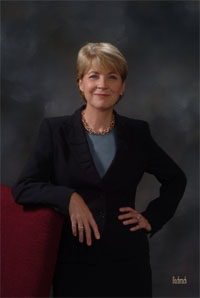US Senate race in Mass. too close for LGBT comfort

Martha Coakley
It may well be shaping up as nail-bitter. The race to fill the U. S. Senate seat held by the late Senator Edward M. Kennedy has tightened up considerably in the past few days, with Republican State Senator Scott Brown closing within two percentage points of Democrat Attorney General Martha Coakley.
Released Tuesday, a Rasmussen telephone survey found Coakley with 49 percent of likely voters, Brown with 47 percent, while Independent candidate Joseph L. Kennedy (no relation to the late Senator) had three percent. Two percent were undecided. Previous polling show Coakley with a double-digit lead.
Yet another indicator of a close race: The fund-raising prowess Brown demonstrated recently when he raised more $1.3 million within 24 hours, relying on 16,000 donors nationwide. The GOP candidate, employing a web-based call for dollars, dubbed his fundraising, “MoneyBomb.” Clever and successful enough, the Drudge report took notice, gracing its web page with a photo of Brown. A headline read: “Will this man end the Dem super majority?”
What’s at stake for Democrats and the White House is nothing less than its current filibuster-proof majority in the Senate and the ability of the Obama presidency to have a fighting chance at accomplishing its goals.
Brown has said he will be the 41st vote against Obama’s health care reform legislation. Coakley supports the president and Congress’ reforms and will vote for health care reform.
What’s at stake for gay Americans?
“It’s the most important race that’s gong to happen in a long time,” said U. S. Representative Barney Frank (D-Mass.) who has been working with Senate leaders on one important LGBT-specific issue related to health care reform.
The House version of the health care bill incorporates the Tax Equity for Health Plan Beneficiaries Act, a measure that would end unfair taxation of employer-provided domestic partner health benefits. Allison Herwitt, legislative director for the Human Rights Campaign, says the so-called “DP tax” is a “significant tax burden” that same-sex couples currently bear.
“I’ve been working with Senate leadership to go along with the [equity provision],” said Congressman Frank, speaking by phone from Washington, D. C. “We’re likely to get that done, but not if there’s no bill.”
Meanwhile, back in Massachusetts gay civil rights groups are scrambling to get out the word and the vote for Coakley.
Echoing Frank’s observation, Scott Gortikov, executive director of MassEquality, a leading state gay political group, said, “This special election is the single most important event LGBT voters, our friends, and family have faced since the equal marriage fight here in Massachusetts.”
Both MassEquality and the Massachusetts Gay & Lesbian Political Caucus, the state’s leading LGBT lobbying group, are revving up LGBT people in the state to get to the polls Tuesday.
“Scott Brown not only voted against our community, but he did so unequivocally, proudly, and loudly,” said Arline Isaacson, chairwoman of the Caucus. During the heated marriage equality debate in Massachusetts from 2003 to 2007, she said, “Brown voted at least 20 times against marriage equality, over and over again.”
“Brown’s policies are antagonistic toward the LGBT Community,” said Gortikov. “He supports the [federal] Defense of Marriage Act (DOMA), he supports Don’t Ask, Don’t Tell, he opposes the Employment Non-Discrimination Act, and transgender rights.”
Coakley has been a strong and long-standing booster of LGBT equality.
“She will easily continue Kennedy’s legacy of LGBT leadership,” Isaacson said. “We won’t have to convince her. She gets it and is with us.”
Isaacson said this week’s Rasmussen poll numbers and Brown’s fundraising are “wake up calls.”
“Martha Coakley will be one of the strongest supporters of same-sex marriage in the Senate,” said Rep. Frank, pointing to the attorney general’s lawsuit, filed this past summer, in federal court challenging the constitutionality DOMA.
During a telephone interview before the special primary, Coakley discussed the lawsuit, one of great importance for the LGBT community statewide and across the country.
“Here’s a federal statute telling us how to treat married couples in a matter that has been always left to the states,” she said. “[The law] serves no purpose, its only purpose is to discriminate.”
The special election to fill Kennedy’s seat is Tuesday, January 19.


[…] a report card showing that he supports the ban on gay men and women serving openly in the military, a position also noted by MassEquality, a leading state gay political group. However, in an interview with ABC News that […]
[…] report card showing that he supports the ban on gay men and women serving openly in the military, a position also noted by MassEquality, a leading state gay political group. However, in an interview with ABC News that […]